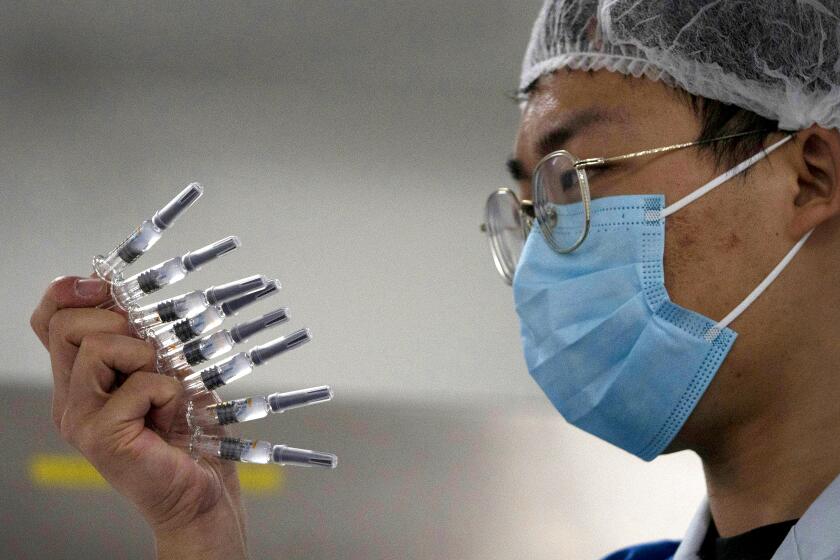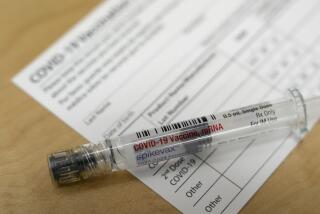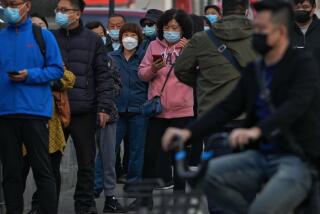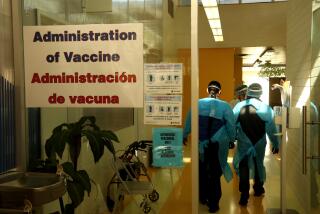Hong Kong halts use of Pfizer vaccine, citing defective lids

- Share via
HONG KONG — Hong Kong suspended use of the Pfizer COVID-19 vaccine Wednesday after its Chinese distributor informed the city that one batch had defective vial lids.
The city’s government said that the suspension was immediate and that the matter was being investigated by distributor Fosun Pharma and BioNTech, the German company that created the vaccine with American drugmaker Pfizer.
BioNTech and Fosun Pharma have not found any reason to believe the product is unsafe, according to the statement. However, vaccinations will be halted as a precautionary measure.
The defective lids were found on vaccines from batch No. 210102. A separate batch of vaccines, No. 210104, will also not be administered.
The semi-autonomous territory of Macao also said Wednesday that its residents would not use Pfizer shots from those batches.
The vaccines from the batch No. 210102 total 585,000 doses, with batch No. 210104 holding 758,000 doses, according to Hong Kong Director of Health Constance Chan.
China has already injected hundreds of thousands of people with COVID-19 vaccines. Vaccines that have not yet completed clinical trials.
Although about 150,000 doses from batch No. 210102 have been administered in the city so far, officials said during a news briefing Wednesday that the vaccines were safe despite the packaging defects, and that suspending use was a precautionary measure. Batch No. 210104 remains in the warehouse and has not been distributed.
Chan said there were more than 40 instances where medical personnel found defective packaging, such as cracks in the vials or leakages when the vaccine was diluted with saline before being administered.
None of these vaccines was given to residents and they were thrown away, officials said.
“Fosun has promised to carry out an immediate investigation so they are going to approach the manufacturer in Germany to look into their plant,” Chan said. “When the vaccines arrive in Hong Kong, they will have a review of the whole logistics chain to see if that’s the cause of the current situation.”
She said that officials are urging manufacturers to give a report as soon as possible to check if the batches of vaccines in Hong Kong can be used. Otherwise, the manufacturers will have to deliver another batch of shots as soon as possible.
BioNTech said in a statement that it had launched an investigation to find the cause of the packaging issues. It said the investigation would look into the entire supply chain of the vaccines from the time the vials were filled all the way to their handling at vaccination centers.
“The safety of our vaccines and patients is of utmost importance to BioNTech,” the statement said. “At this point, we have no reason to believe there is any safety risk posed to the population.”
The company also said that no other region aside from Hong Kong and Macao had been supplied with doses from the affected batch.
Fosun Pharma said in a filing to the Hong Kong stock exchange that it received notice from BioNTech regarding the packaging defects Tuesday night and informed Hong Kong and Macao authorities Wednesday.
The suspension of the Pfizer shot means that the only vaccine currently offered to residents is China’s Sinovac.
German expatriate Jannis Partsafas was among a group of people who received the Pfizer shot ahead of the suspension.
“I got vaccinated this morning at 8:30 a.m. before the news went public about the vaccine suspension, and heard the news when I was on my way home,” said Partsafas, 32, who works in the sporting goods industry.
“I’m not very concerned about the safety, but I am worried that this may mean more people will turn down the option of getting vaccinated in Hong Kong, which would impact herd immunity and the lifting of social-distancing measures,” he said.
As of 8 p.m. Tuesday, 403,000 people had received vaccines in Hong Kong, of which 150,200 had received the first dose of the Pfizer vaccine, compared with 252,800 who had received the Sinovac shot.
More to Read
Sign up for Essential California
The most important California stories and recommendations in your inbox every morning.
You may occasionally receive promotional content from the Los Angeles Times.











